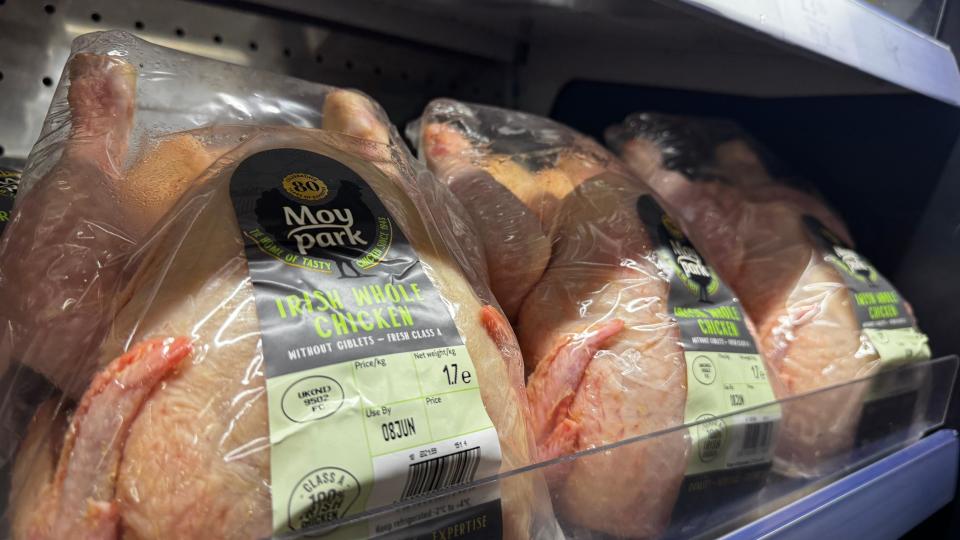Hundreds of environmental breaches by Moy Park
A major chicken supplier in the UK has breached environmental laws in the way it discharged waste, a BBC investigation has found.
Documents filed with Stormont’s Department for the Environment, Agriculture and Rural Affairs show the company has breached legal limits on hundreds of occasions across three different sites in Northern Ireland.
The agri-food company, which is valued at over a £1bn, is Northern Ireland’s largest private-sector employer.
Moy Park said all trade effluent is strictly controlled and treated before it is discharged, with it undergoing additional treatment by Northern Ireland Water before it enters waterways.
Moy Park supplies branded and own label chicken products to retailers and foodservice providers throughout the UK, Ireland and Europe.

Trade effluent is the name given to the liquid waste produced by factories and businesses which typically ends up in the sewage system.
The discharges have the potential to be highly polluting and are subject to strict environmental limits set out in trade effluent consents.
These are overseen by Stormont’s Department for Agriculture, the Environment and Rural Affairs (DAERA).
Breach those limits and businesses could be committing a crime.
As part of a wider investigation into pollution at Lough Neagh, BBC Spotlight examined thousands of environmental compliance documents filed by Moy Park with the regulator since 2017.
The documents revealed hundreds of breaches of the company’s trade effluent consents.
Sampling by Northern Ireland Water found that Moy Park had breached legal limits relating to a number of potential pollutants, including ammonia and hexane extractable materials including oils, fats and grease.
"This can't continue"
Andrew Muir, Northern Ireland’s Agriculture and Environment Minister, told BBC Spotlight he was “very concerned” after the programme brought him its findings.
“I’ll be writing to Moy Park seeking an explanation in terms of the situation you outlined. This can’t continue.”
The environmental regulator, the Northern Ireland Environment Agency (NIEA), operates within DAERA.
When asked why the regulator had not prosecuted the breaches previously, Mr Muir said he would be seeking answers from his officials.
Moy Park told BBC Spotlight, that any breaches of its trade effluent consent incur a charge payable directly to NI Water for further treatment to ensure the water is safe before any discharge to a waterway.
It added that the algal blooms on Lough Neagh were a complex issue, not specifically linked to any one sector.
The company said it is “committed to working with all partners in line with a science-based approach to preserve the vitality of Lough Neagh".
What is happening to Lough Neagh?
Campaigners fear that breaches of trade effluent consents, sewage spills and agricultural pollution are combining to fuel the growth of toxic cyanobacteria at Lough Neagh.
Blooms of the toxic blue-green algae developed on the lough last summer, with signs already showing it is returning.
Moy Park, which is owned by American agri-food giant Pilgrim’s, has a number of factories in Northern Ireland.
It recently sponsored the Belfast Marathon and has previously advertised at high-profile sporting events including the 2010 World Cup.
The company’s sites in Dungannon, Ballymena, and Craigavon sit within the catchment area for Lough Neagh and each reported multiple breaches of the trade effluent consent.
Trade effluent discharged from these sites typically receive additional treatment at one of Northern Ireland Water’s (NIW) treatment plants.
This is intended to ensure that the effluent does no damage to the watercourse it flows into.
However, NI Water told Spotlight that a portion of the wastewater at its sites is discharged before it can be treated.
On 25,000 occasions each year, raw sewage and untreated trade effluent spill from its facilities.
NI Water said “discharges from trade premises at higher levels than set within their consent conditions will pose an additional risk to the environment during the operation of storm overflows".
It blamed historic under-investment for shortcomings in its network and said the spills cannot be stopped without additional sustained investment.
Mr Muir also announced the creation of a new team with a specific focus on stopping pollution at Lough Neagh.
“I’m re-prioritising within the department towards environmental protection and I am setting up an enforcement team around the issues associated with Lough Neagh.
“We have over 20 people dedicated to that area and it’s absolutely critical that we do that," he said.
Mr Muir told Spotlight he would be bringing a report on Lough Neagh to the next executive meeting along with an action plan, which he hopes other ministers will sign off on.
Water pollution campaigner and Undertones frontman Feargal Sharkey told Spotlight he was horrified by the extent of the problem.
“The simple truth of the matter is – putting all that poo, all that waste, all that animal bi-product into a waterway like Lough Neagh, you simply add a massive food source to bacteria that already exists naturally.
“That’s why you have environmental laws and that’s why the law says that should not be happening.”
Spotlight: The Lough Neagh Monster looks at industrial, agricultural and sewage pollution at the lough.
It is available to watch on the BBC iPlayer now and on BBC One Northern Ireland at 22:40 on Tuesday 4 June.


